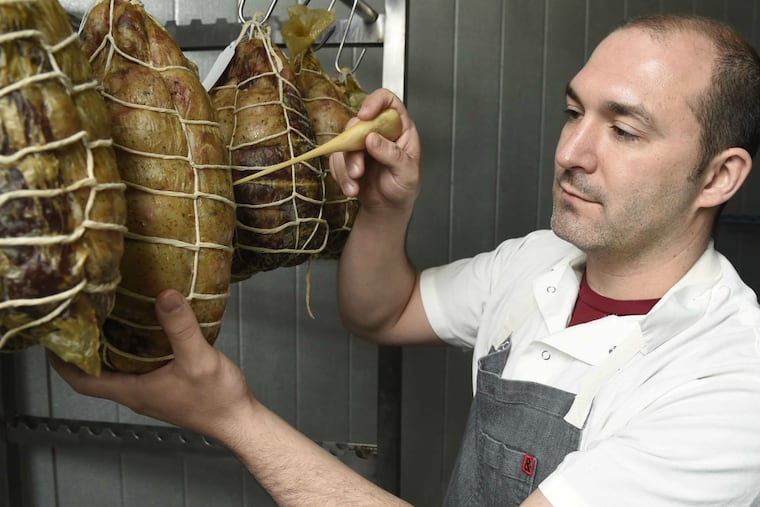Local meat, Italian tradition for chef Joe Cicala's new salumi business
Joe Cicala's meat is ahead of schedule. But that doesn't mean it'll be eaten anytime soon. "This is perfect," says the chef, grinning as he gently thumbs a butcher-twined hunk of pork the size and shape of a beehive. We're standing close in a stuffy, funky-smelling curing room, an industrial walk-in where a few dozen culatellos, cut from the rear leg of the pig, dangle on metal S-hooks.

Joe Cicala's meat is ahead of schedule. But that doesn't mean it'll be eaten anytime soon.
"This is perfect," says the chef, grinning as he gently thumbs a butcher-twined hunk of pork the size and shape of a beehive. We're standing close in a stuffy, funky-smelling curing room, an industrial walk-in where a few dozen culatellos, cut from the rear leg of the pig, dangle on metal S-hooks.
Cicala pulls out a leather sheath housing his ago di osso di cavallo, a bone chisel carved from the femur of a horse that could pass for a weapon on Game of Thrones. Drawing the insanely sharp tool and wielding it like a dagger, he plunges the business end into the flesh of a few hanging specimens, sniffing it on the way out. An off-putting odor would indicate curing has gone awry, he explains. To him, it smells just as it should - rich with black pepper, red wine, and rosemary, the simple seasonings that make culatello, the so-called king of cured meats, what it is.
"These might not take 18 months," Cicala says, taking a proud step back from his handiwork. "They may even be done by July or August."
In our current era of instant food gratification, rife with fast-casual dining, on-demand delivery, and smartphone grocery shopping, the slow art of salumi is a culinary dinosaur, an interminable practice requiring more patience than many of us are willing to give. (Consider how much your life could change in the two years it takes to properly age a single prosciutto.) But Cicala has long made a point of doing things "the Italian way," where the key ingredient is time. His new business, Salumificio Cicala, is well on its way. But you're not going to get your hands on a single bite until it's 100 percent ready.
As the chef of Le Virtù and chef-partner of Brigantessa, both on East Passyunk Avenue, Cicala is intimately familiar with old-world techniques, from pasta-making on down. Curing is something he's done for some time at Abruzzese-focused Le Virtù, but it took encouragement from Ari Miller, owner of 1732 Meats, to pursue growing it into a business.
"He planted the seed in my head," Cicala says of Miller, who has expanded 1732 from a guerrilla operation run out of his Lansdowne home to a 10,000-square-foot facility in Yeadon. Known for off-kilter bacon flavors as well as specialty products like guanciale (succulent pork jowls) and pomegranate-cured lonza (pork loin), Miller has plenty on his professional plate - but he also has ample extra room, which allowed him to take on Cicala as a contract packing, or "co-packing," client.
Because Miller's digs already are vigorously vetted by the USDA, Cicala is freed up to focus on product rather than paperwork. And he's honoring centuries-old practices by hewing to strict recipes, processes approved by the Italian consortiums that enforce Denominazione di Origine Protetta (DOP), the legal designation protecting the signature foodstuffs of various European regions. Prosciutto di Parma, for example, can be sold under that name only if it's produced in Parma, in the same way sparkling wine can be called "Champagne" only if it originates in that province of France.
"The flavors are approachable [and] super-traditional," says Cicala, who's also aiming to make his process nitrate- and nitrite-free. As of now, he's using the bare minimum of "pink salt" required by Miller's USDA guidelines. Employed to cure the meat and protect against food-borne pathogens, the ingredient is a stratifying topic in the charcuterie community due to its reputation as a carcinogen. (It also affects color and flavor.) In the future, Cicala will pursue approval for an amended plan allowing him to substitute an all-natural celery extract that meets the same safety standards, keeping the results closer to what would be found in Europe.
But there's also a strong local element to Cicala's business plan. The pork he's using comes from Paul Crivellaro of Country Time Farm in Hamburg, Berks County. His humanely raised "large black" pigs, a heritage breed, are very close in elegant flavor and fat-to-meat ratio to the Nero di Parma hogs used for salumi in Italy's Emiglia-Romana region.
This regional focus extends beyond protein to include flavorings and seasonings, like spicy chili peppers from Green Meadow Farm in Gap, Lancaster County, that he'll use to make hot Calabrese sausage. Even the sea salt, the most vital catalyst for the curing process, comes from Cape May. "I can't buy Italian pork, so I am sourcing everything - or as much as I possibly can - locally, which is what Italians do naturally," Cicala says. "I want to represent our terra."
Hearing the chef run through his ambitious plans for Salumificio Cicala - small batches of a Felino-style salami, plus Finocchiona, bursting with the aroma of wild fennel, are ready now, with more on the way - is enough to stir hunger. But it's important to cut any eagerness with a healthy dose of perspective.
Products such as rolled pancetta, Sicilian-style sausage with pistachios, the spreadable hot salami nduja, and the coveted culatello eventually will find their way into local stores and markets. But, like all the best cured meats, it's going to take time - on the consumer side, and on Cicala's, too.
"Right now, it's a side project," the budding salumaio says. "I'd like it to be a segue to the point where I would not have to cook every day. . . . That would be amazing. But those are pipe dreams right now."